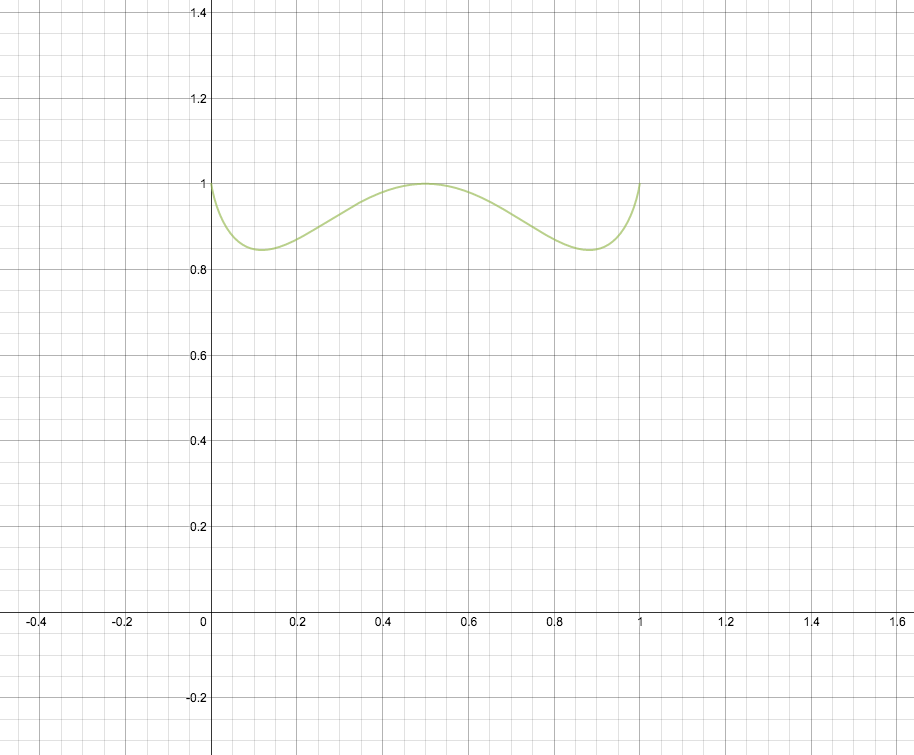Mathematical Enigma - XIII
Let a and b be positive real numbers such that a + b = 1 . Find the maximum value of a b b a + a a b b .
The answer is 1.
This section requires Javascript.
You are seeing this because something didn't load right. We suggest you, (a) try
refreshing the page, (b) enabling javascript if it is disabled on your browser and,
finally, (c)
loading the
non-javascript version of this page
. We're sorry about the hassle.
6 solutions
Didn't understand how that a b b a + a a b b = a + b a b b a + a + b a a b b
Since a+b = 1, so you can basically raise any number to the power of 1/ (a + b) and nothing changes
1/ (a+b) is root a + b
This isn't super rigorous, but here was my intuition and the graph that confirmed it:
Let's make a function, f(x) =
x
1
−
x
(
1
−
x
)
x
+
x
x
(
1
−
x
)
1
−
x
.
f(x) = 1 when x = 0, 1/2, or 1, and plugging into f(x) an x value between 0 and 1/2 or between 1/2 and 1 gives a function value less than 1.

Looks like a moustache !
Given that a +b=1
Applying AM greaterthan GM for a^b+b^a we getthe maximum value is 2×ab^(a+b÷2) =2×ab^(1÷2)
and again applyAM greter than GM for a+b=1 we get maximum value is 2×ab^(1÷2)=1 so the maximum value is 1
No. What you get is
2 1 ( a b b a + a a b b ) ≥ a a + b b a + b = a b
And of course, 2 1 ( a + b ) ≥ a b only. So you don't have enough information and can't proceed further.
Weighted AM-GM does the job perfectly a + b b a ( a + b ) + a b ( a + b ) ⩾ ( a b ( a + b ) b a ( a + b ) ) a + b 1 = a b b a a + b a a ( a + b ) + b b ( a + b ) ⩾ ( a a ( a + b ) b b ( a + b ) ) a + b 1 = a a b b Add these two, we get a b b a + a a b b ⩽ a a + b + b a + b = a + b = 1
1) By the AM-GM Inequality 2 a + b ≥ a b = > 2 1 ≥ a b
Note: a + b = 1 = > b = a − 1
a b b a + a a b b = > a a − 1 b a + a a b a − 1 = > a ( a b ) a + b ( b a ) a
2) Again, by AM-GM a ( a b ) a + b ( b a ) a ≥ 2 a b
Combining (1) & (2)
a b b a + a a b b ≥ 2 ( 2 1 ) ≥ 1
To make the maximum value of the expression,
in a+b=1 a and b must be 1/2,
because think about what value would give maximum to a*b; 1/4 would be the maximum output by two 1/2.
Thus, plugging 1/2 into the expression of the problem, one gets 1/2 + 1/2,
So the answer is 1.
It will be 1
What will happen if a is 1/4 and b is 3/4?
The answer will then be 1.28415825
By extended AM-GM inequality,
a b b a + a a b b
= a + b a b b a + a + b a a b b
≤ a + b a b + b a + a + b a a + b b
= a + b
= 1